TR Review: Kevin Smith’s Tusk Shows the Director at His Best and Worst
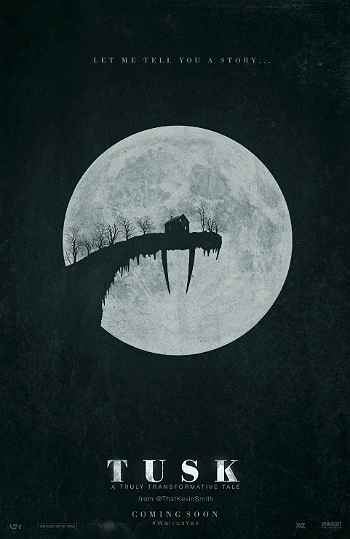 |
It seems like you’re not allowed to be a Kevin Smith moderate these days.
His fans take any negative comment whatsoever as a mortal wound and proof that you have a biased agenda. His non-fans just as often insist on laying down intense vitriol, as if anything less is inadequate to shame the fat man out of existence. And Smith himself feeds this in part by going back and forth between self-deprecation (like non-stop references to his weight) and moments of extreme pettiness (the whole “kicked off a plane” thing). But through it all, I’m fairly constant: I like some of what he does, and I don’t like some of what he does. He can be very funny and insightful, and he can also make himself such a target for mockery at times that it’s impossible to resist.
Tusk marks the first time I have felt all these things about one of his movies.
It’s absolutely fitting that the protagonist – you wouldn’t really call him a hero – of Tusk represents both the best and worst of the way Smith probably sees himself. Wallace (Justin Long) is a smartass podcaster, one who we’re reminded used to be a sweet, sensitive and less successful guy who started making money once his humor turned more mean-spirited. In an overly labored joke, the show he cohosts with Teddy (Haley Joel Osment, now looking like a fat stoner) is called the Not-See podcast, based on the fact that Teddy won’t go anywhere to look at anything, and not-see “hilariously” sounds like Nazi when you say it aloud.
What sets the plot in motion is a viral video gone way askew (sadly, it features a Sharknado-bad special effect that takes the viewer out of the reality) which sends Wallace up to Canada to interview the kid responsible. When that fails to materialize, Wallace is stuck in Manitoba, out the cost of a plane ticket, and desperate for another story, which he thinks he finds above the urinal in a bar. It’s an ad offering free room and board for a lodger, but mentions that the one doing said offering has lived a long and exciting life at sea with many tales to tell.
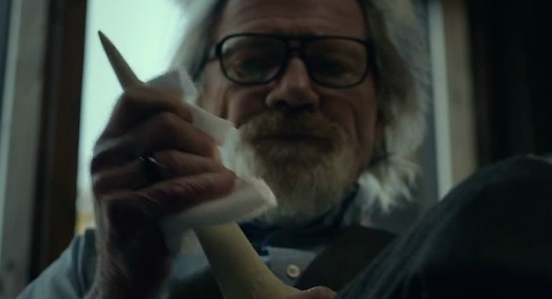 |
Wallace is intrigued, and drives two hours into the country to the large, near-empty house of Howard Howe (Michael Parks), who regales him with tales of encountering Ernest Hemingway at Normandy Beach, and being saved from drowning by a walrus. Now, Wallace may be quite the smartass, but he proves to be not all that smart, drinking heartily of the tea provided, even as his host scrupulously avoids it. When he regains consciousness the next day…he’s missing a leg, and en route to some rather grisly surgery to reshape his body into that of a walrus. Who says there are no original ideas?
The scenes between Long and Parks are some of the best moments Smith has ever directed – while you’d expect that from the veteran Parks, Long does some career-best stuff here, and some of the credit for that has to go to Smith for bringing it out of him. It’s obvious how and where the scenes must go, but these two make it a journey worth taking, from the perversity that gradually emerges from Howe to the way Wallace’s cocky enthusiasm devolves into drugged stupor, fear and anguish. When the full extent of the surgery is finally revealed, it’s a deliciously perverse moment that may make you laugh, cry, shudder in disgust or all three. And this isn’t even a beastiality movie – Howe’s kink is rooted in PTSD and survivor’s guilt rather than any kind of boner fuel. As bizarre as the proceedings are, they’re grounded in a very real kind of weirdness that these two make us believe.
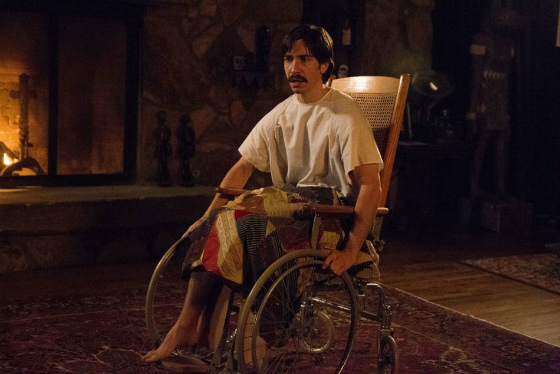 |
Alas, the same cannot be said for some of the other stuff in the film. When Teddy and Wallace’s girlfriend Ally (Genesis Rodriguez) go in search of their missing friend, they enlist the help of an eccentric detective named Guy LaPointe, who has been on the trail of Howe for quite some time. LaPointe, a role billed to an actor also named “Guy LaPointe” (a hockey player’s name in real life), is in fact played by a much more famous thespian whose identity might be considered a spoiler – though if you’ve read anything about this movie or its proposed follow-up Yoga Hosers, you likely know full well who it is. And it’s a disastrous mistake that nearly undoes the movie.
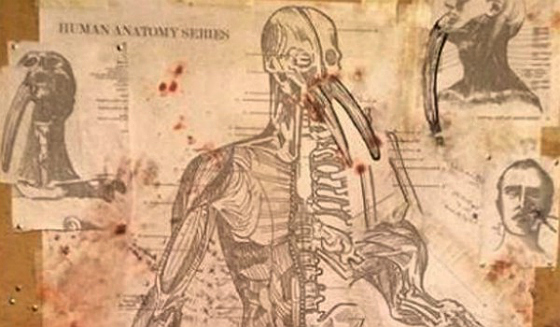 |
Whatever emotional truth Parks and Long bring to their roles, “LaPointe” does the opposite – he’s a Peter Falk impersonation with a Quebec accent and the sort of affected eccentricities you’d expect from this particular performer at his most self-indulgent. Listen to Smith talk about Cop-Out and Bruce Willis, and you come away with the sense that he doesn’t always know how to get the best out of a strong-willed, big-name star; the same is evident here. The one scene “LaPointe” does have with Parks is like a master class in, respectively, how not to get rid of actorly vanity, and how to nail it.
All of which speaks to a larger point – Smith has trouble picking the tone he wants. If he intended this to be a horror movie, there are moments that work perfectly as that, but they’re undercut by the way the comedy devalues the jeopardy of the premise, such as it is. His ear for dialogue remains sharp – Long’s repeated sarcastic use of “Wat?” is dead on – but creating a believable world for the characters remains just out of reach. For one thing, the time-frame is incredibly rushed – to have everything that happens create the effect the narrative requires, especially the ending, it would need to take place over the course of months, rather than days.
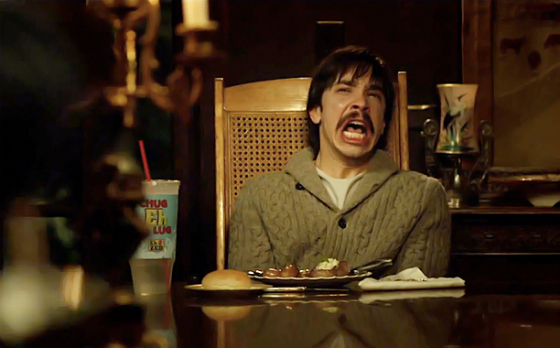 |
Over the end credits, we hear audio from the original podcast on which Smith and Scott Mosier came up with the idea (based on a personal ad that turned out to be fake), including the ending as we just saw it. Granted, they’ve had plenty of time since then to embrace the idea and finding meaning in it, but to hear them giggle like a couple of stoners watching Animal Planet about a finale we thought we were supposed to emotionally invest in feels like a big middle finger, indicting the audience for being dumb enough to ever take it seriously. If all this movie ever was is a big joke for potheads to point at, laugh about, and go “that’s fucked up!” I suppose that’s fair enough – but during the moments in which the film reached beyond that, you sure fooled me into believing there was more to it.
Does Kevin Smith really want to make horror movies? Or anything outside of his personal experience that isn’t just a joke? I had similar issues with Dogma, which flirted with scoring actual theological debate points, then brought them down with silliness like Rufus the black Apostle. At its best, Tusk gives me hope that he can grow. At its worst, it makes me despair that he can’t.
—
Tusk opens Sept. 19th.
